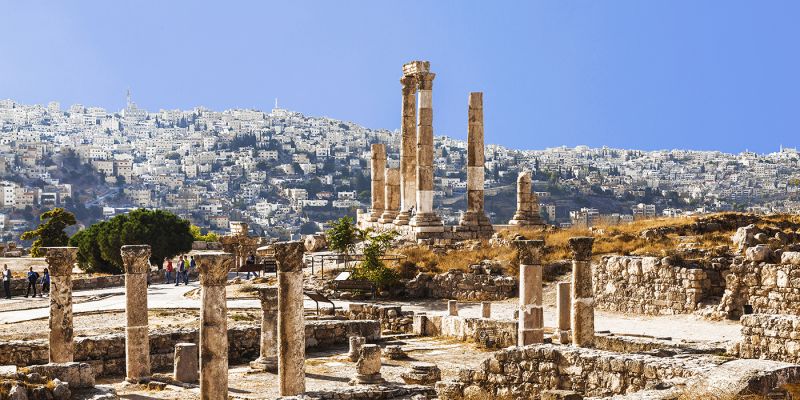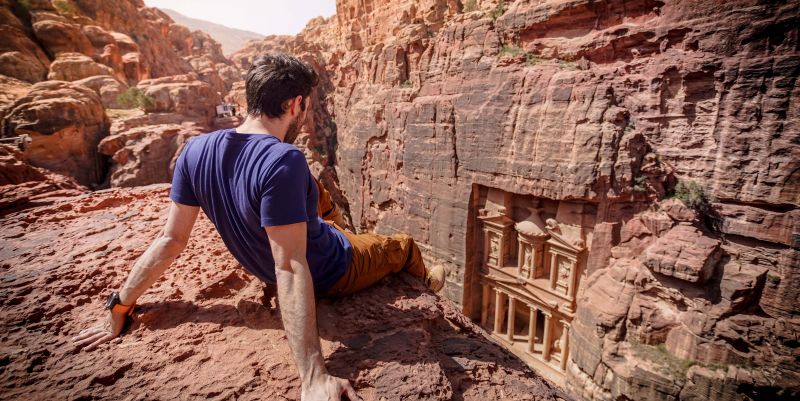Things to Know About Jordan - Top 5 Topics
- The history of Jordan
- Short Message
- The Royal Family of Jordan
- Jordan's Government
- Economy of Jordan
- Tourism in Jordan: over 100,000 archaeological sites
Where is Jordan Located?
Jordan is located in the Middle East and borders Syria, Saudi Arabia, the Red Sea, Palestine, Israel, and Iraq. Covering some 89,342 sq.km., it is located at 31 00 N, 36 00 E.

The history of Jordan - Short Message
Jordan is a land steeped in history. It has been home to some of mankind's earliest settlements and villages, and relics of many of the worlds great civilizations can still be seen today.
As the crossroads of the Middle East, the lands of Jordan and Palestine have served as a strategic nexus connecting Asia, Africa, and Europe. Thus, since the dawn of civilization, Jordan's geography has given it an important role to play as a conduit for trade and communications, connecting east and west, north and south. Jordan continues to play this role today. Take a look at some of Jordan's historical treasures by clicking here or learn more about the history of Jordan's major attractions by selecting a destination from the list below:
- Amman
- Ma'in
- Umm Qais
- Jerash
- The Dead Sea
- Wadi Rum
- Kerak
- Petra
- Jordanian Desert castles
- Shawbak Castle
- Mujib Nature Reserve
- Folklore Museum
- Ajlun
- Aqaba
- As-Salt
- Dana Biosphere Reserve
- Bethany Beyond the Jordan
- Madaba
- Fortress of Pharaoh's Island
- Mount Nebo
- Aqaba
- Mukawir

The Royal Family of Jordan
His Majesty King Abdullah II bin Al Hussein assumed his constitutional powers as King of the Hashemite Kingdom of Jordan on February 7th, 1999, the day his father, the late King Hussein, passed away.
His Majesty King Hussein bin Talal, the father of modern Jordan, will always be remembered as a leader who guided his country through strife and turmoil to become an oasis of peace, stability, and moderation in the Middle East. Among Jordanians, his memory is cherished as the inspiration for Jordan's climate of openness, tolerance, and compassion. Known to his people as Al-Malik Al-Insan ("The Human King"), King Hussein was the forty-second generation direct descendant of the Prophet Muhammad (PBUH)
Jordan's Government
The Hashemite Kingdom of Jordan is a constitutional. The monarch is the head of state, the chief executive, and the commander-in-chief of the armed forces. The king exercises his executive authority through the Council of Ministers. The cabinet, meanwhile, is responsible before the elected House of Deputies, which, along with the Senate, constitutes the legislative branch of the government. The judicial branch is a totally independent branch.
Economy of Jordan
The “upper-middle income” country of Jordan, as classified from the National Bank, boasts a GDP of $40 billion per year with growth rate of 2.6% per annum. However, Jordan Kingdom has a well-diversified economy from trade, finance, communications, transportation, mining, constructions, public utilities, and tourism. Jordan’s official currency is the Jordanian Dinar, which has almost fixed exchange rate towards other foreign currencies like US Dollar or Euro (1 Dinar = 1.43 USD).
Due to Jordan’s well-built infrastructure and value of its cultural heritage, tourism has become one of the most important elements and sources of the national income. The reason is that Tourism represents an important source of hard currency, which helps Jordan to enhance and grow the trade sector as well as to increase national production. It’s working effectively on usage of facilities and services, which leads directly into rate increasing of employment. Beside that it is also helps in use of tourist facilities that are managed, operated and developed by the private and governmental associations.

Tourism in Jordan
Jordan represents some important Eastern old cultures. That appears in some of the existing monuments such as the city of Petra, which is a huge tourist attraction for tourists from different countries.
According to the Jordanian Ministry of Tourism report, Jordan has more than 100,000 archaeological sites; some of them are still in its original state, such as the city of Petra and Jerash. Jordan is also part of the Holy Land and therefore attracts a number of visitors to do some activities of the pilgrimage. The holy sites of Jordan mentioned in the Bible are: Mount Nebo, Madaba, Al-Maghtas, location for the Baptism of Jesus and Umm ar-Rasas. Modern attractions include Amman, Aqaba and the Dead Sea, which is also a place for recreation, rest and holiday
You might need to know more about what to visit and see in Jordan & Egypt. To do visit this link: Egypt Tours
You may also be interested in...
FAQ
A-8 days in Egypt, including a Nile River cruise and professional, private guides, will cost approximately $1,500 per person. Not bad considering this estimate also includes private guides for all of the sites and attractions.
A-There is no FCO advice against travel to Cairo, Alexandria, the tourist areas along the Nile, and the Red Sea resorts of Sharm el Sheikh and Hurghada. The section of the country between the Nile and the Red Sea is also considered mostly safe.
A-If weather is your primary concern, the best time to visit Egypt is during the northern hemisphere fall, winter or early spring (October to April), when temperatures are lower. To avoid the crowds at ancient sites like the Pyramids of Giza, Luxor, and Abu Simbel, try to avoid peak season (December and January).
A- An Egypt visa is required for most travelers including American and British passport holders. Americans and citizens fro 40 other countries can obtain an Egypt visa on arrival at the Cairo International airport at the bank kiosks before the immigration counters for $25 USD and are valid for visits up to 30 days.
A-Pants, Capris, Leggings, and Shorts...Basically, as long as your knees are covered, you are good. So whether you choose pants or capris, you will feel comfortable and remain respectful. Local women wear long pants or skirts.
A-On our Egypt tours that travel south to Aswan, include 3 or 4 night Nile cruise as standard. There is always the option to upgrade to a 5 star Luxury Nile cruise, which offers well–appointed and outward facing cabins.
A-The fixed deposit amount is 25% of the tours total price Except for Egypt Christmas tours, new years and other peak seasons where the deposit goes up to 50%.